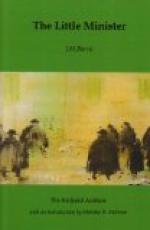It was a dreary scene that met my gaze at break of day. Already the Quharity had risen six feet, and in many parts of the glen it was two hundred yards wide. Waster Lunny’s corn-field looked like a bog grown over with rushes, and what had been his turnips had become a lake with small islands in it. No dike stood whole except one that the farmer, unaided, had built in a straight line from the road to the top of Mount Bare, and my own, the further end of which dipped in water. Of the plot of firs planted fifty years earlier to help on Waster Lunny’s crops, only a triangle had withstood the night.
Even with the aid of my field-glass I could not estimate the damage on more distant farms, for the rain, though now thin and soft, as it continued for six days, was still heavy and of a brown color. After breakfast—which was interrupted by my bantam cock’s twice spilling my milk—saw Waster Lunny and his son, Matthew, running towards the shepherd’s house with ropes in their hands. The house, I thought, must be in the midst beyond; and then I sickened, knowing all at once that it should be on this side of the mist. When I had nerve to look again, I saw that though the roof had fallen in, the shepherd was astride one of the walls, from which he was dragged presently through the water by the help of the ropes. I remember noticing that he returned to his house with the rope still about him. and concluded that he had gone back to save some of his furniture. I was wrong, however. There was too much to be done at the farm to allow this, but Waster Lunny had consented to Duncan’s forcing his way back to the shieling to stop the clock. To both men it seemed horrible to let a clock go on ticking in a deserted house.
Having seen this rescue accomplished, I was letting my glass roam in the opposite direction, when one of its shakes brought into view something on my own side of the river. I looked at it long, and saw it move slightly. Was it a human being? No, it was a dog. No, it was a dog and something else. I hurried out to see more clearly, and after a first glance the glass shook so in my hands that I had to rest it on the dike. For a full minute, I daresay, did I look through the glass without blinking, and then I needed to look no more, That black patch was, indeed, Gavin.
He lay quite near the school-house, but I had to make a circuit of half a mile to reach him. It was pitiful to see the dog doing its best to come to me, and falling every few steps. The poor brute was discolored almost beyond recognition; and when at last it reached me, it lay down at my feet and licked them. I stepped over it and ran on recklessly to Gavin. At first I thought he was dead. If tears rolled down my cheeks, they were not for him.
I was no strong man even in those days, but I carried him to the school-house, the dog crawling after us. Gavin I put upon my bed, and I lay down beside him, holding him close to me, that some of the heat of my body might be taken in by his. When he was able to look at me, however, it was not with understanding, and in vain did my anxiety press him with questions. Only now and again would some word in my speech strike upon his brain and produce at least an echo. To “Did you meet Lord Rintoul’s dogcart?” he sat up, saying quickly:




